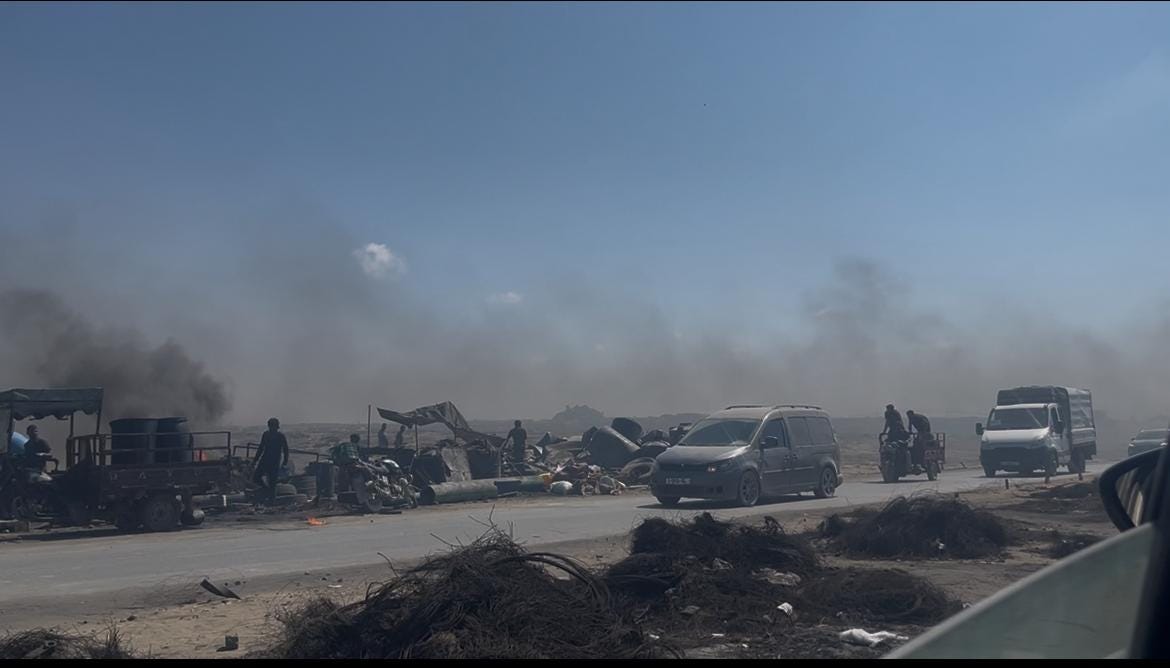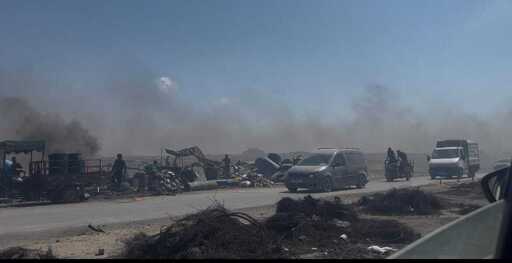Israeli tanks and troops are closing in on the heart of Gaza City as part of its stated plan to seize control and ethnically cleanse the city. The Israeli military is raining down bombs and artillery shells across the area. Residential buildings, high rise towers, hospitals, schools, tent encampments, and malnutrition treatment clinics have all been bombed.
Dozens of Palestinians across Gaza are being killed every day, the majority of them in Gaza City. Hundreds of thousands have been forcibly displaced, both westward within the city, and to the south of Gaza, to Deir al-Balah and Khan Younis.
Sara Awad, a writer and translator in Gaza City, was displaced from her family home to a tent in Deir al-Balah last week. She filed this story about her ordeal.
– Sharif Abdel Kouddous
 Palestinians traveling south from Gaza City after being forcibly displaced by Israel’s military offensive. September 11, 2025. (Photo by Sara Awad.)
Palestinians traveling south from Gaza City after being forcibly displaced by Israel’s military offensive. September 11, 2025. (Photo by Sara Awad.)
Story by Sara Awad
I did my best to be ready for this moment, but no one can be ready to leave home with no return.
The leaflet that fell on my neighborhood of Sheikh Radwan said, “Evacuate to the south.” Fateful words on a small, almost weightless paper. How could a scrap of paper make us feel so powerless?
“Wake up, Sara, we need to flee,” said my little brother Ahmed as he shook my shoulders. He is only seven but aged by the past two years of this relentless war. I was stunned. Even though I knew this day would eventually come, when it arrived, it still felt like a slap to the face.
We quickly started to form a strategy to flee. It wasn’t a trip, it was an escape. I started packing my things, crying while watching my room being emptied, piece by piece. I felt like I was erasing my whole life. Our living room was full of bags, important documents, clothes, and other belongings of life. “Take everything,” my mother told us, “You will miss everything.”
My heart broke into a million pieces realizing that our family home in northwest Gaza City, the home we had managed to stay in throughout the war, had been transformed: from a place we all found comfort in, to a place full of people afraid of an uncertain future. The sense of peace, the joy, the laughter amidst the pain, had been replaced with feelings of enclosure and fear.
Getting displacement orders means nothing when you have nowhere to go.
We finished collecting our things, bags full of our memories. We sat in silence, staring at each other, asking the harshest question again and again: ‘Where will we go?’ The sounds of the falling bombs paralyzed our thoughts. Every airstrike was a shove: “Move now!” We were filled with nothing but fear and anger.
My father made the decision for our family: we would flee south towards the Al-Zawyda area in Deir al-Balah.
It was not easy on him, I could see it in his eyes. I knew how much it hurt his heart to leave everything behind. To leave with no promise of return.
He would leave his home, his job as a university lecturer, his relatives, and his lifelong friends, for one reason alone: to protect us.
He chose to flee not because he wanted to but because he couldn’t bear to repeat our experience in December 2023, when we were besieged in our home by Israeli tanks and went three days without water in unimaginable circumstances. After surviving that we were displaced to al-Shifa hospital for 40 days before we returned home. It was a harrowing period.
The road to the south felt endless, but not because of the distance.
I tried not to look too long at the people who had chosen to remain, some because they had nowhere to go, others because they couldn’t endure the idea of leaving.
Most of my relatives stayed in Gaza City. The trip south would be too arduous for them. I said goodbye to my grandparents and hugged them. I did not know when or if I would ever see them again. We were choosing between two impossible options: death or death.
The road to the south was terrible. People were doing nothing more than trying to survive.
Trucks, cars and buses were packed with Palestinians and their scant belongings. We carried whatever we could to start a life from square one—in a tent.
On the way, I could barely recognize the streets. The places I once knew had been erased by airstrikes. My little brother kept asking, “Are we close to the south?”
We arrived at Al-Zawayda, where my father’s friend had secured a tent for us to stay. We were very fortunate—many people had no shelter and were sleeping on the streets and open grounds.
We spent over $1,000 just on transportation for a few kilometers. That’s not taking into account the cost of paying for a tent or anything else, or the commission fees of simply withdrawing money, which are now nearly 50%.
Which is why many Palestinians in Gaza City chose to stay. It is not because they could endure more suffering, but because they have no money, no resources, no ability anymore to flee.
We arrived and I cleaned the ground. Everything felt heavy. I was so tired, looking around me, how the atmosphere here was different, even though I was still in Gaza, but I was away from my home.
Six days have passed living in a tent and I am still in denial. I refuse to accept the new reality of my life.
This tent was never part of my plan.
My mind was about to explode, many responsibilities were on my shoulders, I had to finish everything and submit my university assignments, just as I always have. I am studying English literature at the Islamic University, though like thousands of students, the war has indefinitely interrupted my degree.
I try to pull myself together, to be strong for my family. But sometimes I just can’t stop the tears. I cried when I saw the tent that was to be my home. I cry because I have truly lost hope of living anymore.
I keep wishing this was just a nightmare. I pray to open my eyes and find it all over, and my home is still here, waiting for us to be inside it again. I don’t even know if it is still standing.
The nightmare is real.
I slept my first night in the tent and woke up the next morning to a harsh reality. The summer heat woke me, bothering me as if the war wasn’t enough. For a second when I opened my eyes, I imagined myself in my room, in my cozy bed. But I am here, sharing a tent with seven of my family members.
We went from a 220 square meter home to a tent barely 16 square meters in size.
How did we end up like this? How can something so ordinary, like home, become a dream? I keep wondering, trying to understand, but it’s unfathomable. Nothing in our life in Gaza makes sense—not the fear, not the displacement, not the starvation, nothing.
I have to adapt to my new harsh reality. I need to be stronger, more resilient, more productive, despite everything I am living through.
I feel like a robot, a machine, pushing my emotions aside, just trying to survive.
I do not know what tomorrow will bring. There is no normal in Gaza anymore. But I am still here, trying to write, trying to deliver my message to the world, sharing my stories, and searching for a university scholarship that I have dreamed of for so long.
This phase of living in a tent will never define me. My home will remain forever in my mind and in my heart.
I won’t let them enclose my life. I am still here, alive and moving forward.
From Drop Site News via this RSS feed


